The third prequel, SOME OF THE PEOPLE covers the opening events of a time in history that you want to forget, but need to remember.
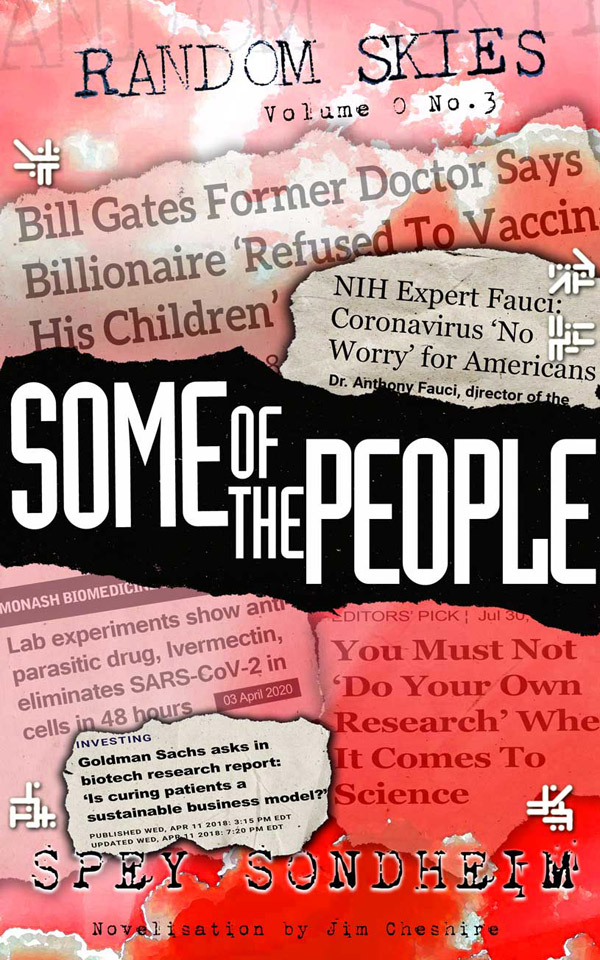
Who knows how many pre-emptive strikes the State made against potential dissidents before Event 201 went live? Rumour has it they cleaned up billionaire mavericks and off-the-rails scientists who were never going to play ball. They visited heads of state and corporate officials who could be persuaded to cooperate with suitcases of cash. Then there were the little people, who may have been accidentally in possession of incriminating tidbits. Their premises got a short visit while they were out, at which point, the housekeeping was considered to be done.
These are the kind of rumours that surface in extraordinary times. Because there has to be a reason for extraordinary events. Right? They're never 'organic.' They don't just pop out of Nature like a wild bat flu.
As the 2020 narrative unfolds, SOME OF THE PEOPLE starts to put together a much deeper and darker agenda. The existing paper trail showed that it had been planned for decades, and now that the technology had caught up to the present, it was time to come overground.
2024
Those who started RANDOM SKIES with QUORUM, will know by now that the first episode was written in 1999, and is set in the year 2032. The original synopsis from twenty five years ago suggests a burnt out planet in recovery from a world war in 2025. That was preceded by a weakening of nations caused by the die-off from a bioengineered virus.
Here we are in our own 2024. Finally, as the last seconds count down, the timeline has the opportunity to split away from the dystopia of RANDOM SKIES and follow another path. If there is no mass die-off in 2024 as the result of measures taken to mitigate the proposed coronavirus of 2020, then we've passed the first milestone.
Then comes 2025. Can a collapsing America and impoverished Europe come to terms with the BRICS nations walking away from the western business model and forging their own future? After all, Asian nations have the population, the resources and the IP manual on empire building.
There doesn't even need to be a war. The West could simply collapse into third world insignificance and be forgotten. It would leave small, balkanised agrarian nations with no social cohesion, no cultural input and no access to the world's wealth. But at least they would have survived.
However, if the people who own and run the western countries have nothing left to lose, then maybe they'll take the old world into the abyss with them. In which case, we're all back on the timeline to QUORUM.
We ae standing at the crossroads. SOME OF THE PEOPLE is the first step down the wrong road. Love it or hate it, but learn from it.
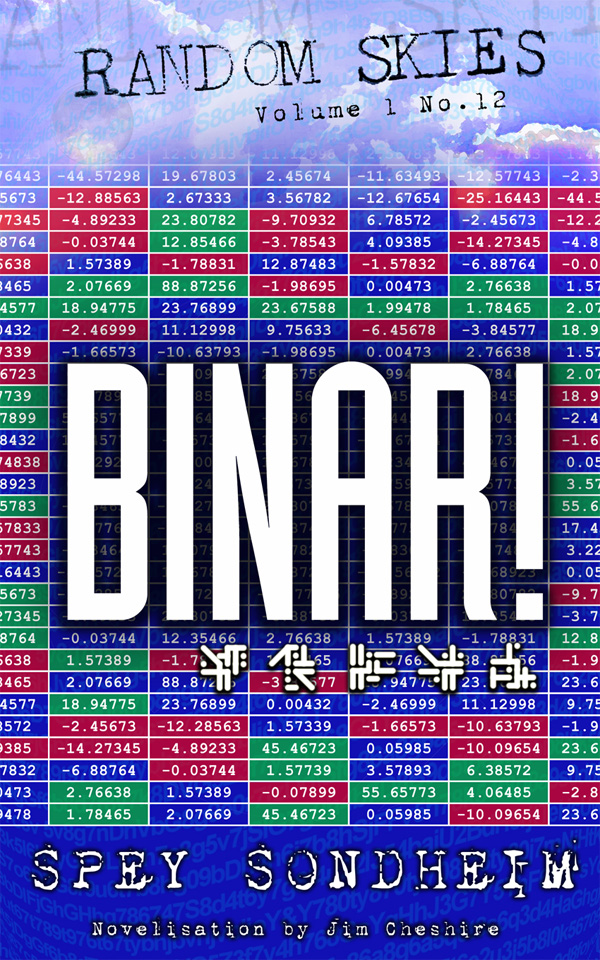
The RANDOM SKIES series is reaching new heights as it matures to the twelfth episode. Characters from way back in the early volumes become relevant to one of the over-arching themes of the series. The will to power through money.
BINAR! begins a process of filling in the mechanics of the RANDOM SKIES universe. What is the structure of a world government and how does it affect all levels of a subjugated society? Are people really so beaten down that they accept their lot, living on allowances and dying in a twenty foot steel shipping container? It would appear not.
The lie that has been sold to people is that they will have nothing and be happy about it. Individuals at the bottom of society are physically kept apart with bogus laws of terrorist and pandemic prevention. The invisible links between the Global Identification handsets are the chains that restrict a gang of slaves and prevent any resistance to the regime.
But all of them have some secret they keep from the brain probes that emanate from their medical implants. In the same way that, years ago, most people knew how to bypass a gas meter, or hook up a line to the street lighting for free power, the beaten down citizens of the future city hellscape have some idea about how to compromise their GLiD and find a sliver of freedom out on the darknet.
Even in the deep wilderness, outside the city walls, where feral children roam and have neither the language to use, nor the equipment to hack, they learn barter and trade with the tools of Nature itself. Crossing the paths of wandering traders by moonlight, and scavenging from dead towns, they live however they can.
The Reaches are, of course, a hybrid of survivors. They have made contacts within the city, they have friends who are well-placed to offer assistance, but it is still an al fresco lifestyle of chance meetings, profit by stealth and survival by skill.
The trade in Binars flows between the classes, rich to poor, and it would surely take a meeting of great minds to pull off something audacious enough to cause massive ripples among the status quo.
What quiet, unassuming Reachman could upset the applecart this time?
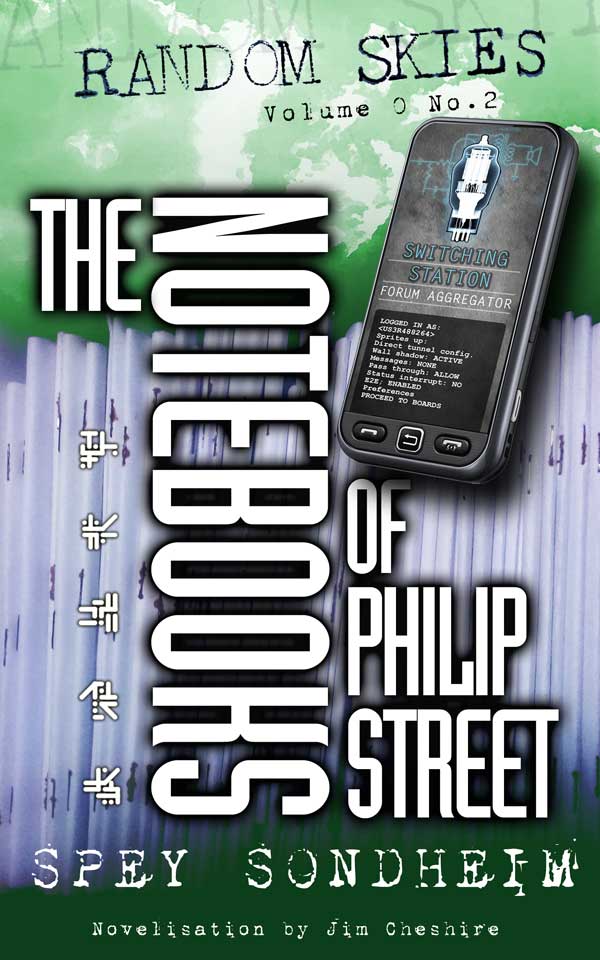
The long shadow of RANDOM SKIES, starts to blot out the old world, that even now is beginning to make the past look like some sort of golden age.
QUORUM was such an unlikely future when it was written in 1999, that no single prequel could glue together the present and the future. Like the 'great reset' itself, there are a number of steps that need to be taken in order to 'reimagine' the hellscape that is opening up before us.
Philip Street is one of the journalists that critical commentators love to hate. He's been a follower of the editorial line for so long that the propaganda slips easily into a thousand words on the benefits of vaccination, the need for aerial drones to monitor the streets of London, or the kindly 'philanthropy' of billionaire globalists who only want the best for the countries they have looted.
In the first prequel, THE END, Philip's world is shaken by the sudden retirement of an old and trusted colleague, who leaves Philip with the bare bones of an unbroken story. In following up the confession of an Indian scientist, escaping from a secret biolab in Uganda, Philip discovers that his communications have always been monitored, his phone is compromised, and his computer has a back door to the Secret Service. But by then it's too late.
It's a shock to the system when Philip is ejected from the London bubble on the eve of the great transformation. It's approaching Christmas of 2019, and he finds that no one in the business is returning his calls, the work has dried up, and all he has to show for it is forty years of tattered notebooks with the names, dates and places of a thousand stories.
In this second prequel, Philip has to overcome the professional aggoraphobia of an unemployed writer in a big, wide world that has no safety nets, no guarantees and not necessarily even the answers that he seeks to the last stories of his career.
In this strange pre-apocalyptic silence, Philip is served only by the curiosity that led him to make sense of a story, back when he was a cub reporter in the Midlands. That curiosity returns when the soporific hypnotism of big city politics has been excised from his mind.
Beginning his journey out into the wilds, Philip begins to learn about the emerging Darknet. He finds out that there is a world of information, truth and activity that the good citizens of the woke suburbs are taught to shun. Are the crazies really as crazy as we're told? Or are they the only sane people left. Philip would have had trouble remembering the exact quote from St Anthony, but it would have gone something like: 'There will come a time when people will go mad, and when they find someone who is not mad, they will attack him saying, "You are mad, because you are not like us!"'
Of course, the real madmen are clothed in the formal robes of the distinguished statesman, the noble scientist, and the international philanthropist. As Philip starts to dig back into the notebooks, he realises that the madmen are on the loose, and he knew it all the time.
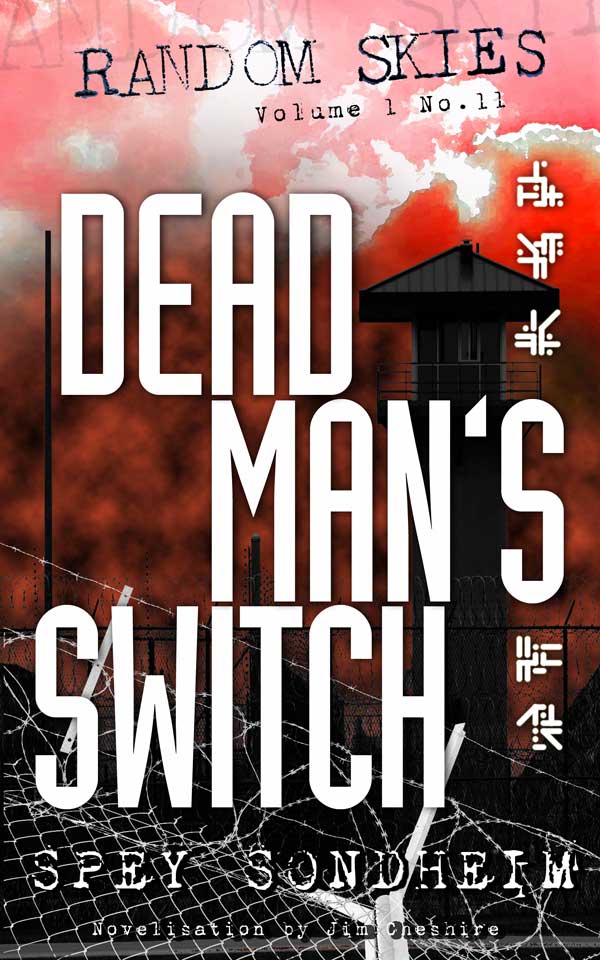
In another exciting ride through the dystopian world of RANDOM SKIES, the individual is pitted against the machine, and survival is the goal.
It's been a while since The Zura Contract hit the shelves, at least in terms of the publishing schedule for previous episodes of RANDOM SKIES.
Between then and now there's been the first prequel (THE END [2021]) that seeks to place the series in context, given that the unforunate circumstances that gave rise to the plot of the very first episode (QUORUM [1999]) actually started happening in 2020.
It can't be ignored that the premis of bioengineered pandemics to usher in a collapsed western world and a new global communist state, has been on the drawing board for a lot longer than fifty years. QUORUM was drawn from the inference of those plans and it's only right that the source of the research should be made available.
However, the main thrust of RANDOM SKIES, is the future that the New World Order delivers for the survivors of the last great war on mankind. The history creeps forward a few months at a time, suggesting triumphs and exploring tragedies.
DEAD MAN'S SWITCH is a study in the desperation of falling through the system, and discovering that the final abnegation is to be discarded in the most abhorrent manner.
Pumshiri's rendition prison is not a place for humans to appreciate life. The designation of implants are changed from the ID of a human National Health Service account to the random stock-keeping unit of a raw material. It is to be used, exhausted and discarded. The prison doctor, Groszmann, is reduced to a mere technician, evaluating body parts for their best price on the illegal market. Organs that were extracted while the donor was still breathing are the most valuable. The waste product that remains is to be flushed through the town's sewage outfall.
It's supposed to be a different story in the privileged enclaves of the retirement villages in rural England. The windowless housing is just as oppressive as a prison, but it's all seen as the 'right thing to do' in the low-consumption resource mentality of 'climate change.' Even sewage is seen as a source of virtue-signalling, proudly fermenting in its bio-fuel eco-tanks.
Just like Pumshiri, where the theft of a small canister of de-greasing solvent is a triumph against the system, in the community of Wildmeadow-on-Froom, a traded packet of vegetable seeds has an almost esoteric value. Freedom, it seems, can be measured in these tiny glimpses of light, through the darkening clouds of an empty life.
Astride these two environments, is the old Shropshire Reach. As life is pitted against the elements and green shoots of a new generation begin to show through, the Quantumhead darknet site are battling in cyberspace. The_Gnome leads the charge to Pumshiri, with Hokey as his wing-man, in a most unusual vehicle of war.
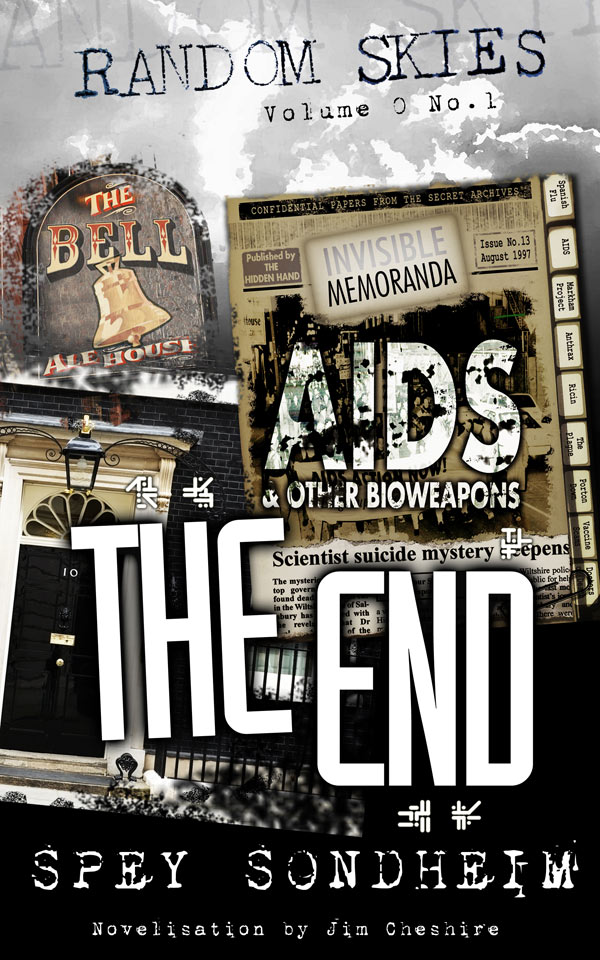
It's July 2019 and, in a world of innocence, people follow their trades, book their holidays and sit around at street cafés. So secure are they in their 'rights' as free citizens that the unthinkable can sneak right up behind them undetected.
As the RANDOM SKIES series continues, why is this the right time to produce a prequel? Firstly, despite Jim Cheshire's repeated wishes over the last twenty years, the dystopian world of QUORUM (written in 1999) has yet to be derailed.
It was hoped, in fact fully expected, that some benificent event would magically transform life into one of rainbows and unicorns, ripe with the promises of a liberal and inclusive la-la land. While dingbat hippies everywhere smugly promoted the Age of Aquarius with its heady clouds of universal brotherhood and understanding, the Random Skies website was sporadically updated to reflect the fact that nothing was changing the course of the potential humanistic disaster outlined in QUORUM.
In 2020, the world entered the latest stage of the QUORUM storyline. A "worldwide pandemic" emerged, totally spontaneously and without precedent, and affected the working direction of every government in the world instantaneously. The "pandemic" was immediately given an identity, a provenance, a cause and the promise of a solution. Air travel was stopped, borders closed and citizens were confined to their homes. People stood in line to be "tested" to see whether they had caught the deadly disease, while hospitals breathlessly reported agonising mega-deaths. The media painted a picture of corpses stacked like winter firewood unless the world's citizens took a new sort of "vaccine" that thankfully emerged as spontaneously as the disease.
Well, you know how it's turning out already. We need the GLiD that controls life in the 2030s. A handheld portable device that carries your vaccination status, your digital wallet, your carbon points for travel, your food allowances, your public insurance against hate speech and predatory behaviour by far-right, white males. And a whole lot more tokens and permissions that might allow you to negotiate the maze of new planned city living in the next decade.
The second reason for a prequel (or prequels), is based in the readership. At the time of writing, the first ten episodes of RANDOM SKIES Series One have been released. It's not the easiest of reading, especially in the light of current events, but there is a solid base of "US3Rs" whose curiosity and will to endure, offer hope for the future. As long as we read everything we can, digest ideas and discuss solutions among intelligent equals, we have a chance to ride out this storm.
The feedback from the RANDOM SKIES readership has been the best news in two difficult years, and the questions and thirst for detail has been in no small part responsible for THE END. Perhaps the bridge between the old world (which politicians and self-appointed masters like Klaus Schwab are insistent will never be seen again) and the soulless nightmare of our transhuman future, needs to be understood better. It may help us to digest concepts such as GLiDs, subdermal implants and the abolition of private property in a future slave state. It may provide a window into the self-serving madness of a psychotic elite who are entirely convinced by their faux-occult justification of amoral genocide, that they smile as they kill and accept no limits on their addiction to power.
So, we distilled the main concerns and frequently asked questions into the prequel narrative. The two major questions that have been asked repeatedly about the RANDOM SKIES series have concerned the logistics of the timeline.
If the first episode, QUORUM, was written in 1999, how was the premise arrived at? Namely, that the world of 2032 would be all about the recovery from upheavals in the early 2020s, caused by bioengineered vaccine pandemics that ushered in a new totalitarian world order?
The short answer has always been that there was no way to know, there were no crystal balls or Nostradamian scrying sessions. It was a case of extrapolating forward from information available at the time, but of little interest to the general public. Worse, any mention of military bioweapons, pharmaceutical malpractice or insane and psychotic banking families was met with casual derision and the 'conspiracy theory' trope. People preferred to remain firmly asleep and in blissful denial, with their realities and opinions sculpted for them by the media. In fact, most people still do.
At the time of writing, the "pandemic" has reached a stage where the information that informed QUORUM in 1999, is now being discussed even at US Senate level. The US patent system is a (currently) indelible paper trail of the registration and development of "novel" viruses and their corresponding treatments. It includes the 1970s when the military joined with the pharmaceutical companies to develop toxins that could wipe out whole countries.
The people in the frame today began their main work on Gain Of Function research into coronaviruses, after the release of QUORUM, and it is their footprints across the laboratories, the stock markets and the Economic Forums that are in the spotlight today. They have built on the ghastly, unsupervised experiments that began with the Nazis, and the eugenics movements, and never really stopped, simply drifting underground and away from public scrutiny.
The second question is a certain curiosity about the eccentric characters that inhabit the silent and stunned world of the collapse. In QUORUM, we drop straight into the narrative of claustrophobic cities and the spellbound obedience to a planned life under a permanent state of emergency. Why aren't people questioning the loss of billions of human lives? Are they simply in shock, or are they so starved of information by the media that the survivors have grown up into their 'new normal?'
Who are the disparate band of misfits and damaged desperadoes hiding in a secluded off-grid village in the hills? What is their history and how did they fall in together?
As in all crises, people of different social status, religious belief and ethnic culture, suddenly discover their commonalities. The kind of cooperation that sees survivors through ecological and cosmic disaster is rekindled.
If people can still think, they can break the programming of the cult media. If they can endure hardships on a point of principle, they can break the addiction of comforting welfare handouts that keep them hooked on government. If they rediscover the core values of human social living, then even in a wilderness, they can place one stone upon another, building new cities and a new future for the children of mankind.
Tyrants throughout history have sought to obliterate every trace of their enemies because they have to destroy utterly before they can build. Yet enemies still exist, and the fight for freedom goes on. Perhaps THE END is where it all begins.
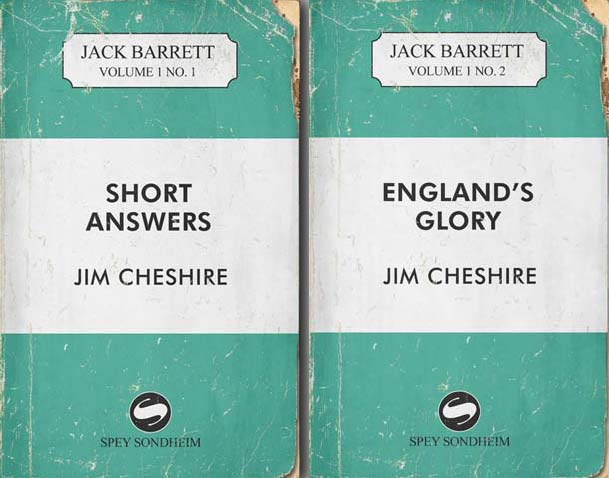
For the first time in thirteen years, some of the Jack Barrett books are back in print. This is the start of a complete re-evaluation and republishing program that will see new editions added to those of the past.
The first two to be published to Amazon are both significant, but for opposite reasons. The very first in the chronological series, Short Answers, was written in 2020 ahead of the republishing program. Therefore, it is technically, 'the latest', despite being Vol. 1 No. 1. There can be nothing before it.
Short Answers is the natural prequel to England's Glory, which started the original publishing program in the 1980s, and was the first acknowledged 'finished' novel that Jim Cheshire ever wrote. We have therefore, got the latest next to the first, and they work together seamlessly.
If Short Answers is the run-up to the discovery of the 'curiosity gene' then England's Glory is the discovery, in a nutshell, of that external world that runs on 'resources.' Barrett is mired in the unequal struggle with his contemporaries, not to achieve the same goals, but to survive in the game.
In retrospect, it's easier to understand why it had to be written so soon after the events it describes. The shock of falling unaided into the deep end of a regime, for which there was neither warning nor preparation, produced a catharsis that had to be addressed in order to be understood. With the foundation of these first two books laid, the missing pieces of the seventies and then on into the eighties, can be safely constructed.
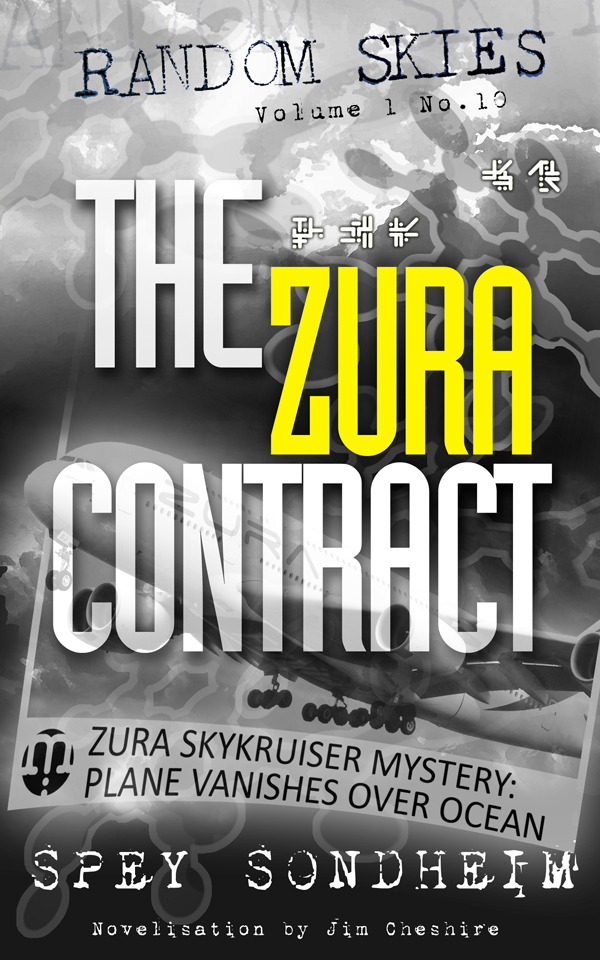
Random Skies rolls on to episode ten, The Zura Contract, in Kindle and paperback formats on Amazon.
Someone once said that the history of the world is the history of warfare between secret societies. Once the general public is locked down in the container parks, being forced to fulfil television quotas, there's not really much need for secrecy.
In 2040, the power struggles within the new world order continue to centre around the staking of territorial claims. The Zura Aerospace Corporation have purchased a giant land platform in the Indian Ocean called the Southern Star. CEO Ulrich Hanser plans to take full advantage of its maritime status in international waters and declare it sovereign territory, beyond the reach of terrestrial laws.
But the great resource controllers of the planet, the world banking system, is determined not to let Hanser find a safe haven for secret technologies that might challenge their hegemony. What delicate mechanism can they use to wrestle troublesome patents away from Zura, without upsetting the world's executive class, whose enormous wealth is dependent on such intellectual property? What they need is a crisis.
Sir Roly Tumble dies aboard his luxury yacht, The White Rabbit. The world is shocked at the loss, and are glued to their screens watching endless tributes in eight days of mourning. Behind the scenes, an even greater panic ensues. The Holy Roly All-Faith Foundation is audited by the banks who are the first creditors in line, and discover a worldwide trafficking operation that runs from Hollywood to big business, and from the heights of government to the occult temples of the idle rich.
The MI's Operation Sundog swings into action, like a sledgehammer in search of a nut.
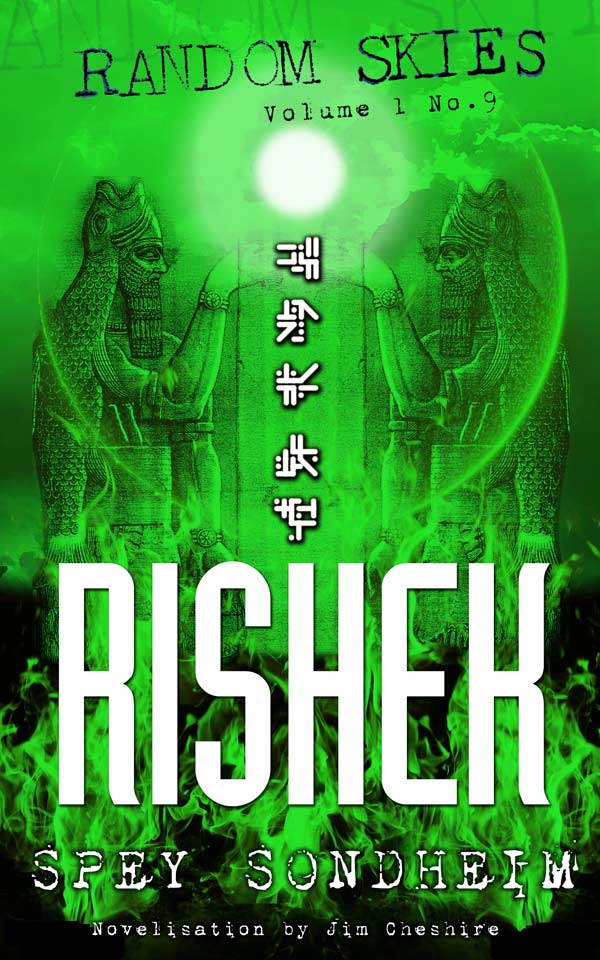
The ninth episode of Random Skies is out in Kindle and paperback formats on Amazon.
The episode takes us forward to 2039, continuing the roughly one year intervals between books. The new book is cold comfort for Random Skies fans, as the situation for our favourite wilderness survivors is not improving by much.
But then, it's a book about war, by stealth as well as force. The Reaches take the first steps toward joint manoeuvres when the desperate Northern tribes come south to raid a convoy moving past the Midlands. The corporations are choosing unwise alliances that interfere with the elites own power struggles. In the frame is renegade General Pavel Rishek, one of the once-trusted inner circle, whose hand is revealed when a mysterious submarine surfaces in the Sea of Japan.
At the same time, the data wars of the hackers on the darknet and their nemesis, the MI, have taken casualties on both sides. Obscure game engines, running on redundant servers around the world, are gradually being taken out of service, denying the US3Rs vast amounts of storage, bandwidth and speakeasies.
Getting 18 terabytes of literally world-changing information into the hands of the resistance is paid for in the loss of UCD3, an old trading sim that had been falling apart for years.
Then there are the 'in-game bonuses'. The_Gnome's love of old military records and documents turns up an MI ghost town on the Pakistan-Afghan border and brings home a trove of documents, that lead to the capture of a big fish and a grim clue to the origins of the H61K pandemic. But he's not finished. On a new game server called Take To The Air, he discovers an Easter egg that will provide an answer to Bruno's eternal question: what is Random Skies?
